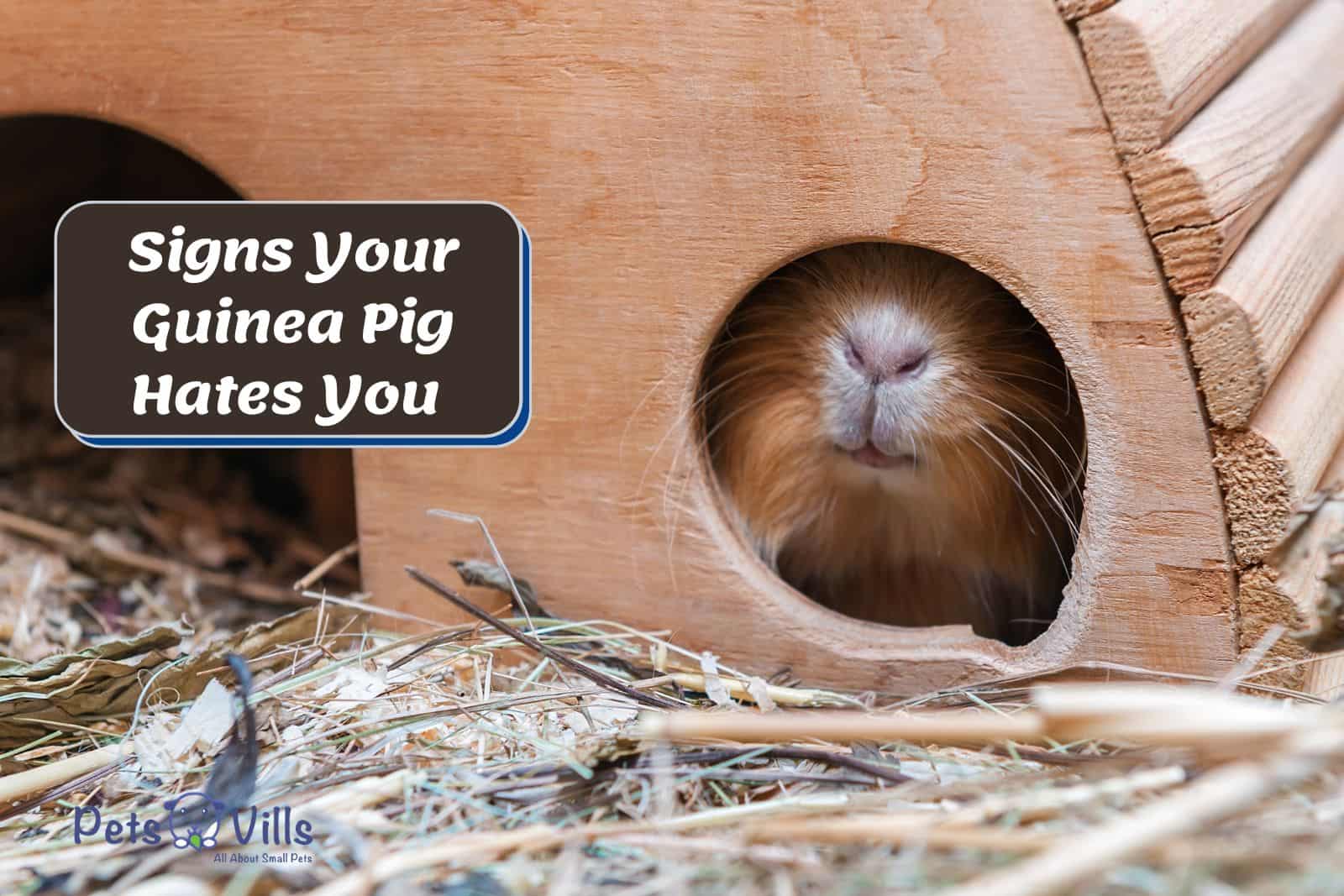“Signs your guinea pig hates you?” Now, that’s a hoot!
As a seasoned guinea pig parent, I can tell you these delightful little fluffballs don’t do ‘hatred.’
They might throw a ‘weekly’ tantrum or even give you a little nip, but it’s not personal.
Come with me on this journey to better understand our guinea pig pals – I’m about to fully delve into the world of piggy communication!”
Table of Contents
Key Takeaways
- Guinea pig behaviors like freezing, nipping, or refusing to play often signal discomfort or fear rather than ‘hatred.’ These behaviors are their way of communicating their feelings and preferences to you.
- Building trust with a guinea pig takes time, patience, and gentle handling. Regular, positive interactions can help them associate you with safety and comfort, gradually reducing their fear or discomfort.
- If your guinea pig continues to show discomfort or fear, it’s time to consult a veterinarian or animal behaviorist. They can provide valuable insights and guide you on the best steps.
Understanding Guinea Pig Behavior
Ah, the wonderful world of guinea pig behavior! As a guinea pig parent, it’s like decoding a secret language [1].
They don’t have a personal vendetta against you, I promise. What seems like ‘hatred’ is often just their adorable, sometimes puzzling, way of expressing fear.
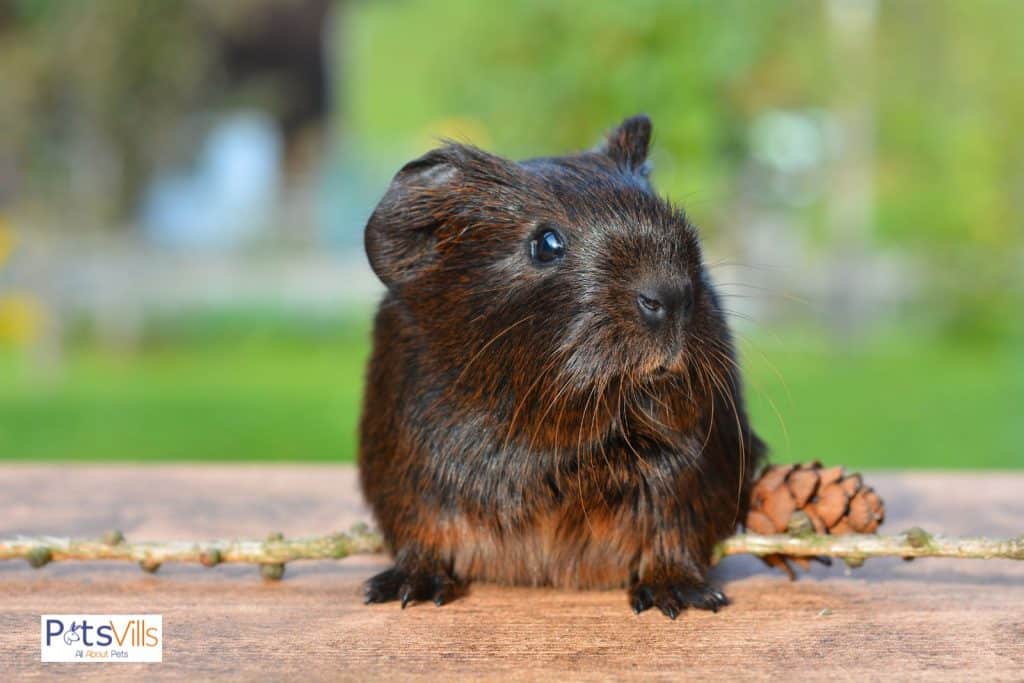
You see, our fur babies are prey animals in the wild. So, that skittishness? It’s all about survival.
Their quirky behaviors and body language are their automatic responses to perceived danger. However, you’ll find that patience and a safe environment can turn into trust.
So, let’s put aside the idea of ‘hatred’ and focus on building trust with our furry friends. After all, they’re just asking for some understanding in their piggy way!
For a deeper dive into this topic, let’s explore more about “guinea pigs body language” and how it can guide us in nurturing our furry companions.
7 Signs of Guinea Pig Discomfort or Fear
Guinea pigs are adorable and loving pets without a hateful bone in their bodies. But sometimes, owners can mistake a cavy feeling fear or discomfort for hatred.
So it’s essential to recognize these common behaviors and understand what they mean. If you do, it becomes much easier to help your furry friend feel safe and comfortable.
Let’s not waste more time exploring the seven common signs of guinea pig discomfort or fear. It’ll help you become a better pet parent.
#1 Running Away or Hiding
Is your furry friend always running away or hiding when you’re around? Don’t worry, it’s not a personal rejection, and you’re not among the world’s worst piggy parents!
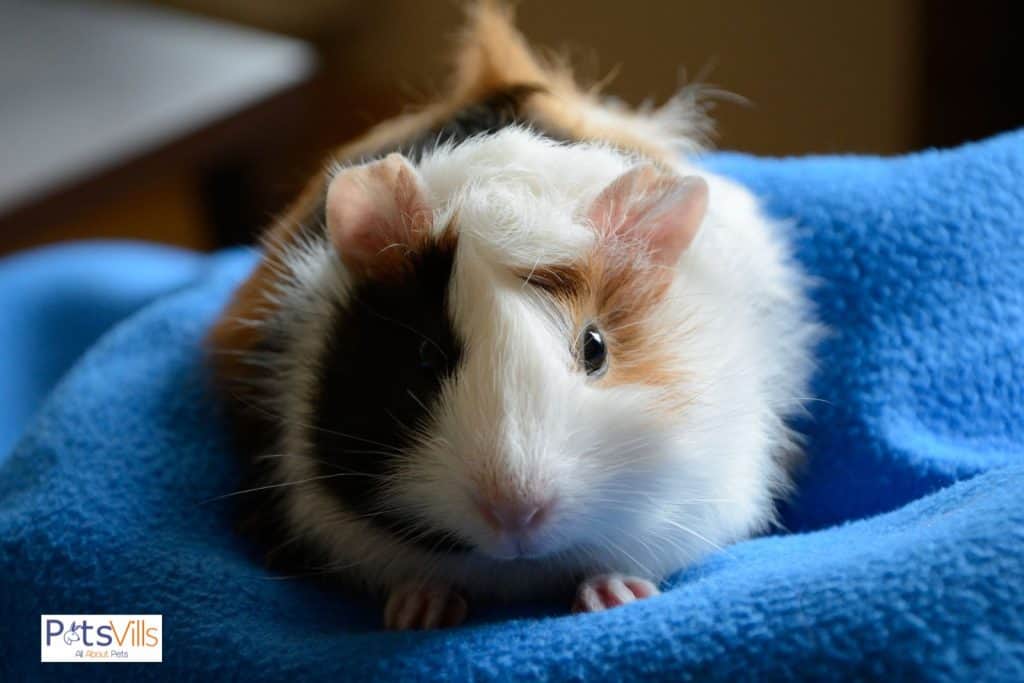
I can tell you it’s simply their version of ‘stranger danger.’ These delightful little fur babies instinctively bolt when they sense anything unfamiliar or potential predators.
It’s like they’ve got their mini superhero alter-ego – ‘The Flash,’ but in fur coat form! It’s their survival instinct kicking in.
So, next time your guinea pig darts off like they’ve got super speed, remember, it’s not about you. They’re taking care of their safety in their own adorable, zoomy way.
With some patience, gentle handling, and plenty of bonding time, they’ll soon realize you’re a friend.
#2 Freezing
Ever walked in on your guinea pig looking like they’re participating in a super intense game of freeze tag? They stand there, completely still as a furry little statue!
This behavior, known as ‘freezing,’ is one of the quirkiest things about guinea pigs. It’s as if they’ve been cast in a dramatic role in their version of ‘Mannequin Challenge’!
But don’t worry; they’re not practicing for their next performance art gig. This behavior is an instinct.
In the wild, staying still is a survival trick used to avoid catching the attention of predators. It’s their unique way of saying, “If I don’t move, maybe they won’t see me!”
Your adorable guinea pig is doing what wild guinea pigs have done for generations. Over time, with gentle interactions and a safe environment, they’ll learn they don’t need to freeze [2].
As you continue creating a safe and nurturing environment, you may notice “signs your guinea pig loves you” – let’s explore these indications in the next section.
#3 Biting or Nipping
If your guinea pig gives you a little nip now and then, don’t take it personally! You haven’t offended your fluffy companion or spoiled their day.
I can assure you it’s just another part of their natural behavior. Consider it their slightly painful version of saying, “Hey, I’m not comfortable with this!”
Think of your piggy pal as a tiny, fur-covered diplomat. They will only nip if they feel exhausted from all other diplomatic options!
It could be their way of feeling cornered or just a bit peeved. A nip isn’t a declaration of war; it’s a signal that they need space or a change in their handling.
Over time, you’ll learn to read their subtle signs better, avoiding the need for them to resort to ‘bite diplomacy.’ Every nip is just a step to better understanding your piggy pal.
To learn more, check out this video:
#4 Flicking Their Backside or Chattering Their Teeth
Does your cavy flick their backside or chatter their teeth when you’re around? Let me tell you, this is just their dramatic way of saying, “I need some me-time!”
Picture your furry pal as a little diva, flicking their backside like a superstar tossing their hair. It’s their sassy way of expressing annoyance or agitation.
And those teeth chattering? It’s not because they’re cold or trying to audition for a role as a typewriter. Instead, it’s their way of showing they’re not exactly thrilled with the current situation.
Your aggressive guinea pig isn’t being rude; they’re just asking for a bit of space or expressing their displeasure.
Respecting their boundaries and adjusting your interactions can make a world of difference. It’ll turn those backside flicks and teeth chatters into happy guinea pigs’ purrs.
#5 Refusing to Eat or Drink
Don’t worry; they’re not on a hunger strike protesting against too many carrot slices! Instead, changing their eating or drinking habits is often a sign of stress.
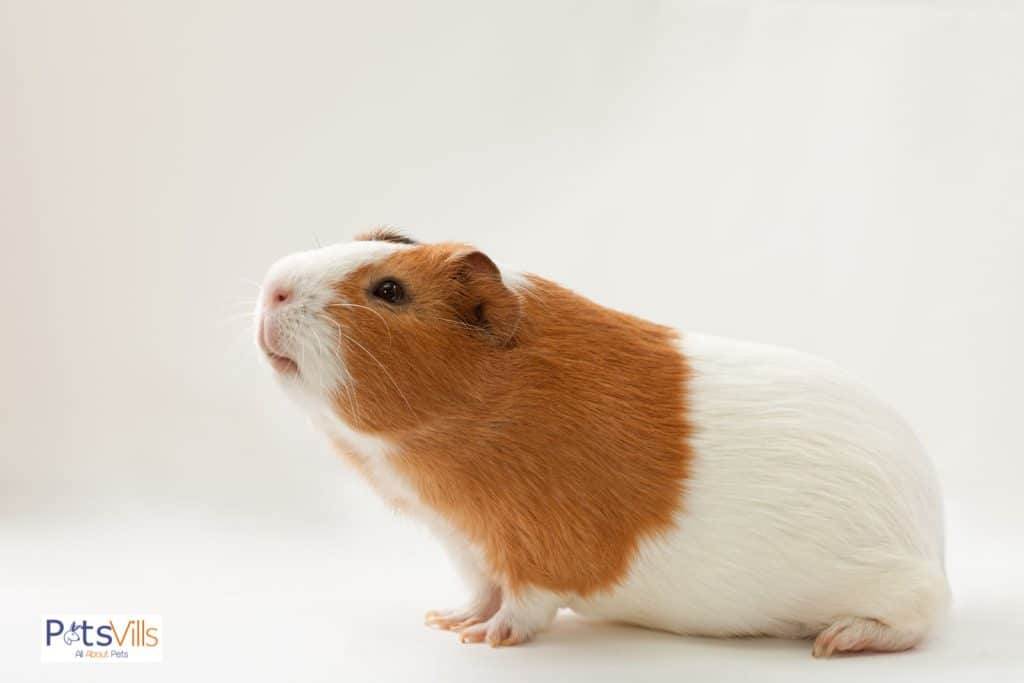
You see, cavies are like the foodies of the rodent world. They love to munch and crunch!
So, when they turn up their nose at their food or water, they say, “This just doesn’t meet my standards!” It’s their way of communicating something that is causing discomfort.
But remember, it’s essential not to ignore this behavior. Sometimes, it could indicate a health issue, and a trip to the vet might be in order.
So, while respecting their food critic impressions is essential, ensuring their health isn’t at stake is equally important.
#6 Loud Whining or Shrieking Guinea Pig Noises
Are you living with a cavy who sounds like they’re auditioning for the lead role in a horror movie? No, they haven’t decided to pursue a career in voice acting!
Let me decode this for you. These dramatic sounds are usually your guinea pig’s way of expressing unease or discomfort.
Imagine your cavy as a tiny opera singer, hitting those notes to communicate their feelings. It’s not a performance for art’s sake but them saying, “Hey, I don’t feel like this!”
Your unhappy guinea pig is using its best tool – its voice – to let you know something’s up. It could stem from a new environment, an unfamiliar sound, or a fellow guinea pig,
Of course, it’s important to note that persistent loud sounds could also indicate a health issue. So never hesitate to consult with a vet if you’re concerned.
#7 Refusing to Play With the Owner
Has your guinea pig suddenly decided they’re too cool for school, refusing to come out and play? Don’t fret! You haven’t raised a fluffy couch potato.
This behavior could be your guinea pig’s saying, “I need a break.” After all, guinea pigs, despite their fun-loving nature, also need their downtime.
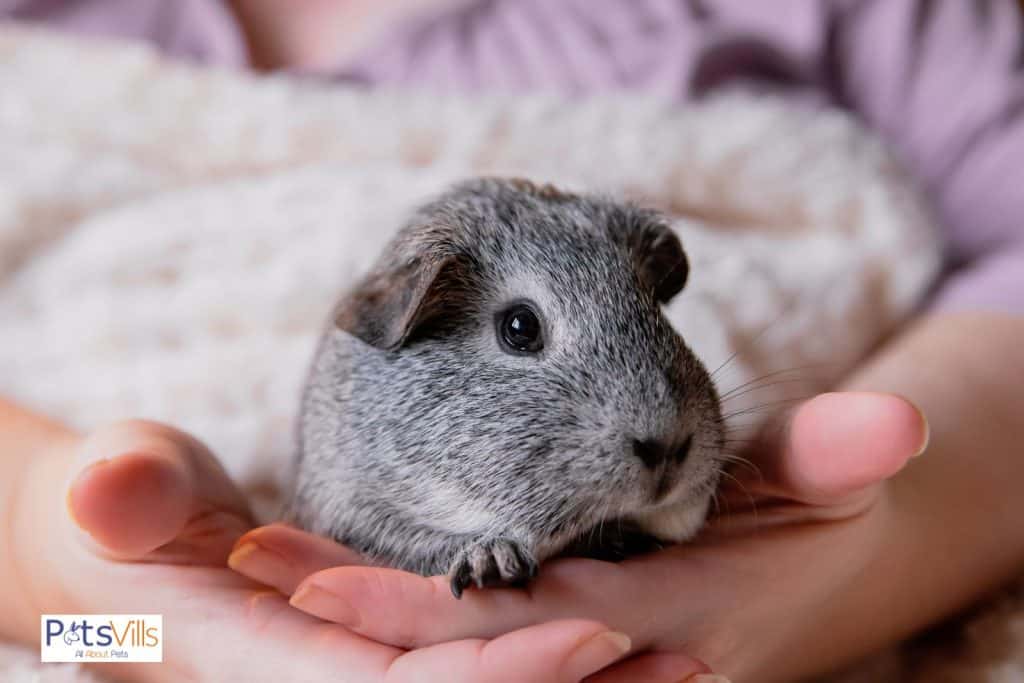
Think of them as furry little introverts who sometimes need to recharge their batteries. That refusal to play could be their way of expressing that they need some ‘me-time.’
However, a constant lack of interest in play could also indicate health issues. A vet visit is good if your content guinea pig is unusually lazy or disinterested.
Despite being sometimes introverted, many still wonder, “Are guinea pigs cuddly?” We must first understand their unique behavior patterns and social needs to answer that.
Mitigation Strategies for Fearful or Uncomfortable Guinea Pigs
Patience is your greatest ally with a fearful or uncomfortable guinea pig. These animals are like tiny, fur-covered puzzles that take time to solve.
They won’t magically trust you overnight, and that’s okay. Instead, let them set the pace, and you’ll find that slow and steady does win the race.
Next up, gentle handling is vital. Imagine yourself as a guinea pig masseuse, always using a light, soothing touch.
They’re not big fans of sudden or loud noises, so keeping interactions calm and tranquil is a surefire way to win them over.
Regular, positive social interactions are also crucial. Think of it as building a friendship: the more quality time you spend with them, the more they associate you with comfort.
Whether feeding them their favorite treats or quietly chatting, these positive interactions will help your guinea pig see you as a friend, not a threat.
Lastly, every guinea pig is unique, and what works for one might not work for another. So, keep experimenting with different strategies and stay consistent.
Your commitment and care will surely pay off. In time, it helps your guinea pig transition from being fearful to building a bond of trust with you.
In your journey toward building this bond of trust, you might begin to ask, “Are guinea pigs affectionate?”
This question is common, and its answer will provide valuable insights as you continue to care for and understand your unique guinea pig.
If you’re having trouble building this bond, here’s an excellent video. It did wonders for me in my time of need:
Determining When to Seek Professional Help
Despite your best efforts, your guinea pig might continue to show signs of discomfort or fear. For instance, the teeth chatters and high-pitched shrieks haven’t subsided.
If this is the case, it’s time to contact the pros. A veterinarian or an animal behavior specialist can provide insight into their behavior.
They’ll determine if the fear/discomfort is from a health issue or behavioral concern. Remember, it’s not a sign of failure to seek professional advice.
On the contrary, it’s a sign of a fantastic guinea pig parent who wants the best for their furry pal. So, don’t hesitate to make the call.
Your distressed guinea pig is counting on you!
FAQs
#1 Can my guinea pig hate me?
No, guinea pigs are not capable of feeling emotions like hate. However, they can display signs of fear or discomfort that indicate a need for positive interactions and trust-building.
#2 Why is my guinea pig hiding from me?
Hiding is a common sign of stress and fear in guinea pigs. It’s important to approach them gently and slowly, using positive reinforcement and treats to build trust and comfort.
#3 My guinea pig keeps biting me. Does that mean they hate me?
No, biting isn’t a sign of hatred. Approach them calmly and gently, building trust and understanding their communication methods to prevent future biting.
Conclusion
Understanding the language of guinea pigs is often similar to cracking a secret code. But the mysterious freezing to the backside flicking are not signs of hatred.
They’re signs of discomfort, fear, or even stress. So getting a handle on them as soon as possible becomes essential.
I can’t stress the importance of patience, gentle handling, and positive interactions enough. But seeking professional help is fine if the signs persist despite your best efforts.
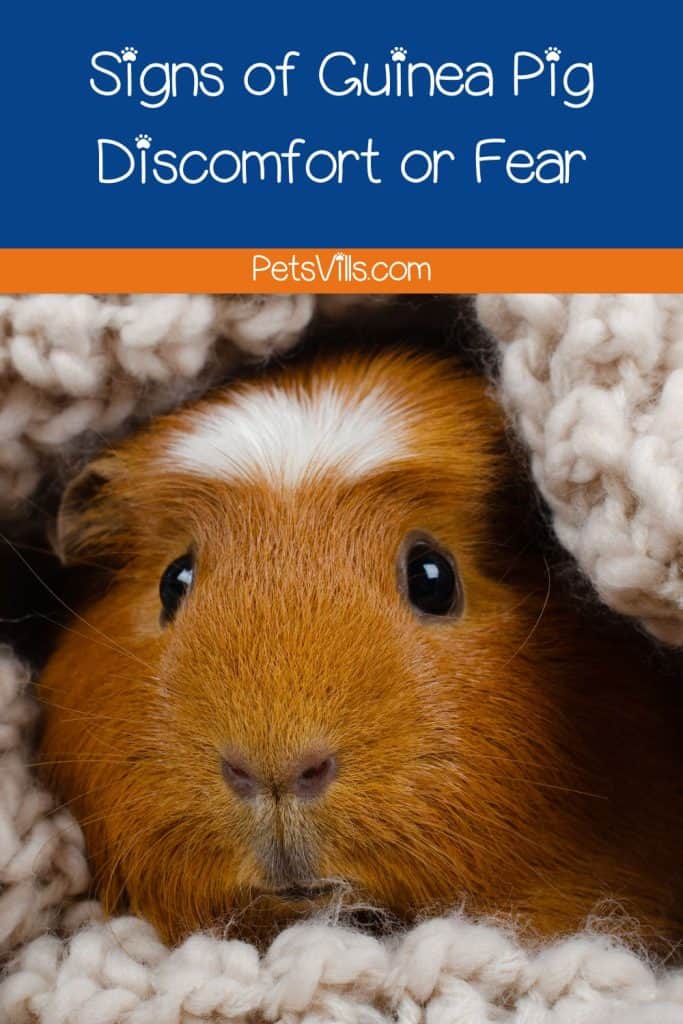
Resources:
1. Green D, Shackleton TM, Jasmine, O. Zobay, Palmer AR, Wallace MS. Communication calls produced by electrical stimulation of four structures in the guinea pig brain. 2018 [cited 2023 May 25];13:e0194091–1. Available from: https://www.ncbi.nlm.nih.gov/pmc/articles/PMC5870961/
2. The influence of human interaction on guinea pigs: Behavioral and thermographic changes during animal-assisted therapy. Physiology & Behavior [Internet]. 2020 [cited 2021 Jan 24];225:113076. Available from: https://www.sciencedirect.com/science/article/pii/S0031938420303905

My name is Ben Roberts, and I absolutely love animals. So, naturally, I love writing about them too! As far as my animals, I have a Pit-bull, a Beagle-lab mix, a Chihuahua, and one old cat. Each one of them provides me with a new adventure every day. And the best part is they’re all best friends. Well, except the cat when he gets a little annoyed.
FIND HIM ON: FACEBOOK and TWITTER.
Read his latest ARTICLES
Learn more about Benhere

